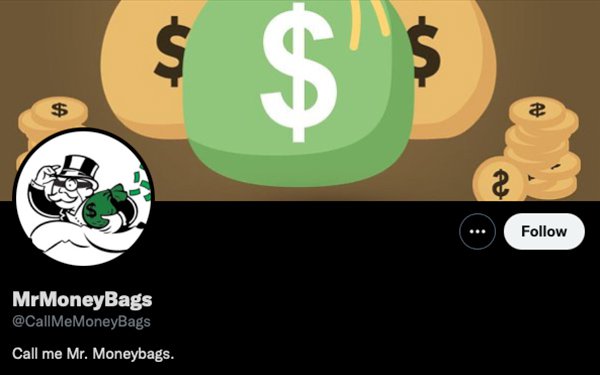Twitter User Who Mocked Billionaire Can Remain Anonymous, Judge Rules
- by Wendy Davis @wendyndavis, June 21, 2022

Siding against the “mysterious entity” Bayside Advisory, a federal judge ruled that Twitter need not unmask the account holder behind @CallMeMoneyBags, who used the platform to criticize private equity firms and their leaders.
The ruling, issued Tuesday by U.S. District Court Judge Vince Chhabria in the Northern District of California, quashed a subpoena issued late last year by U.S. Magistrate Judge Donna Ryu, who ordered Twitter to disclose information that could identify CallMeMoneyBags.
Ryu issued the subpoena at the request of the entity Bayside Advisory, which claimed the Twitter account infringed copyright by posting six photos to the platform in October of 2020. The pictures -- including at least two of a woman in a bikini -- were accompanied by commentary like “Life is good when you are Brian Sheth,” referring to the billionaire former president of Vista Equity Partners.
Chhabria said in a 15-page decision that Bayside's allegations regarding copyright infringement didn't make out a “prima facie” case -- meaning the allegations weren't strong enough to warrant further proceedings on the infringement claim.
The judge also said the account holder's right to speak anonymously outweighed Bayside's interest in the user's identity, adding that Bayside is “a mysterious entity” and that “the circumstances of this subpoena are suspicious.”
“Bayside has not established a prima facie case of copyright infringement,” Chhabria wrote. “Even if Bayside had made a prima facie showing of copyright infringement, the court would quash the subpoena in a heartbeat.”
The ruling comes in a dispute dating to October of 2020, when @CallMeMoneyBags posted the photos to Twitter. Several days after the account posted the photos, Bayside Advisory said it owned the copyright to those photos and directed Twitter to remove them, which the platform did. Four days later, Bayside registered copyrights to the photos.
Bayside then served Twitter with a subpoena for identifying information about the account holder, following which Twitter asked Ryu to quash the subpoena.
Twitter argued to Ryu that Bayside had no valid infringement claim, on the grounds that the photos were protected by fair use principles. Ryu refused to quash the subpoena, ruling that she couldn't conclude that the photos were protected by fair use because the account holder didn't appear and testify.
Twitter then urged Chhabria to reverse Ryu's finding and effectively nix the subpoena. The platform argued that the user's testimony wasn't necessary because the tweets themselves prove the photos are protected by fair use.
“The tweets, from which the user could not derive any revenue, contained candid images of scantily-clad women beside that user’s own critical commentary, such as: 'The only thing better than having a wife…is having a hot young girlfriend' and 'This is how he spends his money. I would say this is a good investment!'” Twitter wrote.
“While further testimony from the anonymous user might assist in a fair use inquiry, it is not necessary,” Twitter wrote.
The civil rights groups Electronic Frontier Foundation and American Civil Liberties Union backed Twitter, arguing in a friend-of-the-court brief that the tweets appear to be "noncommercial, transformative, critical commentary," and therefore protected by fair use.
“Many fair uses are obvious on their face, and courts can rule on the matter without hearing from the speaker,” the groups wrote.
The Copyright Alliance -- which counts the Motion Picture Association, National Association of Broadcasters, News Media Alliance, Netflix and Disney as members -- countered in a separate friend-of-the-court brief that copyright holders should be able to learn an alleged infringer's identity without first disproving fair use.
Chhabria sided with Twitter, ruling that someone who sues for copyright infringement must make at least a preliminary showing that the alleged infringement was not a fair use.
The judge went on to write that @CallMeMoneyBags' used the photos for criticism and commentary -- a key factor judges examine when deciding fair use questions.
“MoneyBags was not using the photos for their artistry,” Chhabria wrote. “Rather, by placing the pictures in the context of comments about Sheth, MoneyBags gave the photos a new meaning -- an expression of the author’s apparent distaste for the lifestyle and moral compass of one-percenters.”
Chhabria added that aside from the fair use issues, the “mystery surrounding Bayside” weighed against the company.
“If the court were assured that Bayside had no connection to Brian Sheth, a limited disclosure subject to a protective order could perhaps be appropriate,” Chhabria wrote. “But the circumstances of this subpoena are suspicious.”
He elaborated that Bayside didn't appear to have formed, or registered copyrights in the photos, until after the tweets about Sheth appeared on Twitter.
“It is not clear what Bayside has to gain from pursuing a copyright action against MoneyBags,” Chhabria wrote.
“Injunctive relief is unavailable, as Twitter has already taken the photos down. Because Bayside registered the copyrights after the alleged infringement, it appears as though Bayside could recover only limited damages that are unlikely to cover the considerable expense of pursuing its copyright claims and no attorney fees,” the judge continued.
He added that he visited Bayside's website during a hearing in May, but found only “a shell of a site with no information about Bayside, what it does, who owns the company, who works for the company, or how any customer could license the photographs the company allegedly owns.”


